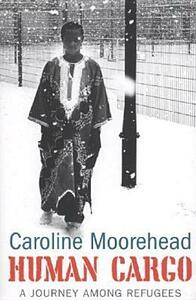Take a photo of a barcode or cover
Refugees and Asylum Seekers have become political footballs in recent years, this book traces the history of the UN High Commissioner for Refugees (UNHCR) and follows the conditions of people seeking asylum in the world today. There are some personal, tragic and horrific accounts of the violence and persecution that people flee from, and the bureaucratic morass and ill-feeling they encounter when they finally arrive at any given destination in search of, not just a better life, but some semblance of human existence. We hear of men and women tortured and separated from their children or partners, one young man even suffered seeing soldiers playing football with his mothers severed head; this is no book for the faint of heart or stomach. It is harrowing, and all the more so because it is true. Such stories ejected from the pen of a Poppy Z. Brite novel would be macabre but fictional, these are not.
The most important aspect of the book is the slow but steady regression of refugee rights when they reach, supposedly more tolerant societies. Australia has lead the world in how to keep the unwanted out and other “western” nations have followed suit making it ever more difficult for people to regain their lost dignity. An important point is made in the disparity of the gender of refugees; it stands to reason that for every male asylum seeker, there is a woman who couldn’t afford to escape, who is burdened with children or simply stuck thanks to a repressive society.
If we judge a nation by how we treat the weakest in it, then shouldn’t we judge the world by that same benchmark? As citizens of the world we have failed our brothers and sisters, and continue to do so with sickening gusto. We were happy to let in the victims of authoritarian communism when escaping the GDR or USSR during the cold war, now we refuse entry to those in need. Refusing to let the needy in is as bad as any nation not letting them out, furthermore, while we continue to tolerate and encourage a world so unequal, then we must also tolerate the victims of that world seeking redress.
The most important aspect of the book is the slow but steady regression of refugee rights when they reach, supposedly more tolerant societies. Australia has lead the world in how to keep the unwanted out and other “western” nations have followed suit making it ever more difficult for people to regain their lost dignity. An important point is made in the disparity of the gender of refugees; it stands to reason that for every male asylum seeker, there is a woman who couldn’t afford to escape, who is burdened with children or simply stuck thanks to a repressive society.
If we judge a nation by how we treat the weakest in it, then shouldn’t we judge the world by that same benchmark? As citizens of the world we have failed our brothers and sisters, and continue to do so with sickening gusto. We were happy to let in the victims of authoritarian communism when escaping the GDR or USSR during the cold war, now we refuse entry to those in need. Refusing to let the needy in is as bad as any nation not letting them out, furthermore, while we continue to tolerate and encourage a world so unequal, then we must also tolerate the victims of that world seeking redress.
This was a heartbreaking and very instructive book very relevant to today. I liked how she divided the book up into the different sections (leaving, arriving, afterward) and dealt with the different issues that concerned each. Overall I felt the author was fairly even handed in her presentation of the topic. It didn't become too preachy, but presented both sides of the argument.
The only weakness, which is not the book's fault, is that even now, ten years later it is somewhat outdated. Not on the overall theme but the severity of the issue. It was almost funny to see her write that refugee numbers are down because anyone who pays attention to the news knows that there is a refugee crisis happening in Europe and there are more refugees worldwide now than since WWII. Not her fault since she can only talk about what was happening at the time, but it doesn't make me curious how or if the book would be changed today.
The only weakness, which is not the book's fault, is that even now, ten years later it is somewhat outdated. Not on the overall theme but the severity of the issue. It was almost funny to see her write that refugee numbers are down because anyone who pays attention to the news knows that there is a refugee crisis happening in Europe and there are more refugees worldwide now than since WWII. Not her fault since she can only talk about what was happening at the time, but it doesn't make me curious how or if the book would be changed today.
